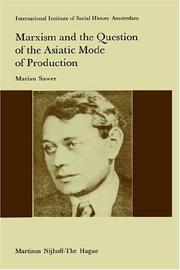| Listing 1 - 5 of 5 |
Sort by
|
Book
ISBN: 9023212894 Year: 1975 Publisher: Assen Van Gorcum
Abstract | Keywords | Export | Availability | Bookmark
 Loading...
Loading...Choose an application
- Reference Manager
- EndNote
- RefWorks (Direct export to RefWorks)
Asiatic mode of production. --- Asiatic mode of production --- Production, Asiatic mode of --- Capitalism --- Economic anthropology --- Economic history --- Marxian economics
Book
ISBN: 9004263705 9789004263703 9789004263697 9004263691 Year: 2015 Publisher: Leiden Boston
Abstract | Keywords | Export | Availability | Bookmark
 Loading...
Loading...Choose an application
- Reference Manager
- EndNote
- RefWorks (Direct export to RefWorks)
In Studies on Pre-Capitalist Modes of Production British and Argentinian historians analyse the Asiatic, Germanic, peasant, slave, feudal, and tributary modes of production by exploring historical processes and diverse problems of Marxist theory. The emergence of feudal relations, the origin of the medieval craftsman, the functioning of the law of value and the conditions for historical change are some of the problems analysed. The studies treat an array of pre-capitalist social formations: Chris Wickham works on medieval Iceland and Norway, John Haldon on Byzantium, Carlos García Mac Gaw on the Roman Empire, Andrea Zingarelli on ancient Egypt, Carlos Astarita and Laura da Graca on medieval León and Castile, and Octavio Colombo on the Castilian later Middle Ages. Contributors include: Chris Wickham, John Haldon, Carlos Astarita, Carlos García Mac Gaw, Octavio Colombo, Laura da Graca, and Andrea Zingarelli.
Asiatic mode of production. --- Production (Economic theory) --- Marxian economics. --- Economic history. --- Economic anthropology. --- Commerce, Primitive --- Economics, Primitive --- Economics --- Ethnology --- Economic conditions --- History, Economic --- Marxist economics --- Communism --- Schools of economics --- Socialism --- Microeconomics --- Supply and demand --- Demand (Economic theory) --- Supply-side economics --- Production, Asiatic mode of --- Capitalism --- Economic anthropology --- Economic history --- Marxian economics --- Asiatic mode of production --- E-books

ISBN: 2082118037 9782082118033 Year: 1990 Publisher: Paris Flammarion
Abstract | Keywords | Export | Availability | Bookmark
 Loading...
Loading...Choose an application
- Reference Manager
- EndNote
- RefWorks (Direct export to RefWorks)
Democracy --- Democratie --- Démocratie --- Inspraak in het beleid --- Overlegcultuur --- Self-government --- Asiatic mode of production --- Mode de production asiatique --- Greece --- Grèce --- Economic conditions --- Politics and government --- Conditions économiques --- Politique et gouvernement --- Democracy. --- Asiatic mode of production. --- Production, Asiatic mode of --- Capitalism --- Economic anthropology --- Economic history --- Marxian economics --- Political science --- Equality --- Representative government and representation --- Republics --- -Economic conditions --- -Democracy. --- -Democracy --- -Asiatic mode of production --- Démocratie --- Grèce --- Conditions économiques --- To 146 B.C. --- Historiography

ISBN: 9024720273 940099687X 9400996853 9789024720279 Year: 1977 Volume: 3 Publisher: The Hague Nijhoff
Abstract | Keywords | Export | Availability | Bookmark
 Loading...
Loading...Choose an application
- Reference Manager
- EndNote
- RefWorks (Direct export to RefWorks)
Marxian economics --- Asiatic mode of production --- Historical materialism --- Asia --- Economic conditions --- Social conditions --- 330.34 --- #SBIB:321H60 --- Marxist economics --- Communism --- Schools of economics --- Socialism --- Dialectical materialism --- History --- Marxian historiography --- Production, Asiatic mode of --- Capitalism --- Economic anthropology --- Economic history --- Economische ontwikkeling. Regionale economische ontwikkeling --- Westerse politieke en sociale theorieën vanaf de 19e eeuw: socialisme, marxisme, communisme, anarchisme --- Philosophy --- Asian and Pacific Council countries --- Eastern Hemisphere --- Eurasia --- Economic conditions. --- Social conditions. --- Asiatic mode of production. --- Historical materialism. --- Marxian economics. --- 330.34 Economische ontwikkeling. Regionale economische ontwikkeling --- Asia - Economic conditions --- Asia - Social conditions
Book
ISBN: 9780521767255 0521767253 9780521749619 0521749611 9780511812422 9780511578731 0511578733 9780511651076 0511651074 0511812426 0511698631 1107194423 0511579470 0511580215 Year: 2009 Publisher: Cambridge Cambridge university press
Abstract | Keywords | Export | Availability | Bookmark
 Loading...
Loading...Choose an application
- Reference Manager
- EndNote
- RefWorks (Direct export to RefWorks)
Through an historical analysis of the theme of Oriental despotism, Michael Curtis reveals the complex positive and negative interaction between Europe and the Orient. The book also criticizes the misconception that the Orient was the constant victim of Western imperialism and the view that Westerners cannot comment objectively on Eastern and Muslim societies. The book views the European concept of Oriental despotism as based not on arbitrary prejudicial observation, but rather on perceptions of real processes and behavior in Eastern systems of government. Curtis considers how the concept developed and was expressed in the context of Western political thought and intellectual history, and of the changing realities in the Middle East and India. The book includes discussion of the observations of Western travelers in Muslim countries and analysis of the reflections of seven major thinkers: Montesquieu, Edmund Burke, Tocqueville, James and John Stuart Mill, Karl Marx, and Max Weber.
Dictatorship --- Islam and politics --- Asiatic mode of production --- Social scientists --- Public opinion --- Political science --- Attitudes --- History --- Islamic countries --- Foreign public opinion, European --- Asiatic mode of production. --- Islam and politics. --- History. --- Foreign public opinion, European. --- Scientists --- Policy scientists --- Opinion, Public --- Perception, Public --- Popular opinion --- Public perception --- Public perceptions --- Judgment --- Social psychology --- Attitude (Psychology) --- Focus groups --- Reputation --- Islam --- Politics and Islam --- Absolutism --- Autocracy --- Tyranny --- Authoritarianism --- Despotism --- Totalitarianism --- Production, Asiatic mode of --- Capitalism --- Economic anthropology --- Economic history --- Marxian economics --- Attitudes&delete& --- Political aspects --- Muslim countries --- Arts and Humanities --- Dictatorship - Islamic countries --- Social scientists - Europe - Attitudes - History --- Public opinion - Europe - History --- Political science - Europe - History --- Islamic countries - Foreign public opinion, European
| Listing 1 - 5 of 5 |
Sort by
|

 Search
Search Feedback
Feedback About UniCat
About UniCat  Help
Help News
News